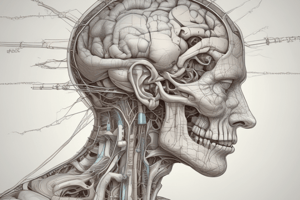Podcast
Questions and Answers
What is the approximate number of neurons in the human brain?
What is the approximate number of neurons in the human brain?
- 100 billion (correct)
- 200 billion
- 500 billion
- 50 billion
Where do thinking and voluntary movements begin in the brain?
Where do thinking and voluntary movements begin in the brain?
- Brainstem
- Cerebellum
- Cortex (correct)
- Basal ganglia
What is the main function of the brainstem?
What is the main function of the brainstem?
- Controlling breathing and sleep (correct)
- Controlling movement and balance
- Processing visual information
- Enabling higher-order functions
What is the role of the basal ganglia?
What is the role of the basal ganglia?
Which lobe is responsible for sight?
Which lobe is responsible for sight?
What is the largest part of the brain?
What is the largest part of the brain?
What is the primary function of the dendrites in a neuron?
What is the primary function of the dendrites in a neuron?
What is the purpose of the myelin sheath in some neurons?
What is the purpose of the myelin sheath in some neurons?
What type of neuron transmits impulses from the CNS to muscles or glands?
What type of neuron transmits impulses from the CNS to muscles or glands?
What is the term for the electrical signal that travels down the axon?
What is the term for the electrical signal that travels down the axon?
What is the function of the terminal branches of axons?
What is the function of the terminal branches of axons?
Flashcards are hidden until you start studying
Study Notes
The Human Brain
- The human brain is the largest, most complex, and highly specialized organ in the body, comprising approximately 100 billion neurons.
- The brain consists of specialized areas that work together to perform various functions.
- The cortex, the outermost layer of brain cells, is responsible for thinking and voluntary movements.
- The brainstem, located between the spinal cord and the rest of the brain, controls breathing and sleep.
- The basal ganglia, a cluster of structures in the center of the brain, coordinate messages between other brain areas.
- The cerebellum, located at the base and back of the brain, is responsible for coordination and balance.
- The cerebrum, the largest part of the brain, is crucial for the learning process, as it is the site of higher-order functions such as memory and reasoning.
Brain Regions
- Occipital lobes are responsible for sight, hosting the brain's visual processing system.
- Temporal lobes are involved in hearing, language, and memory.
- Frontal lobes are responsible for motor function, reasoning, abilities, problem-solving, and judgment.
The Neuron
- A neuron is the basic unit of the nervous system, a specialized cell designed to transmit information to other nerve cells, muscle, or gland cells.
- A neuron consists of:
- Cell body: the cell's life support center
- Dendrites: receive messages from other cells
- Axon: passes messages away from the cell body to other neurons, muscles, or glands
- A neural impulse is an electrical signal that travels down the axon.
- The myelin sheath covers the axon of some neurons, helping to speed up neural impulses.
- Terminal branches of axons form junctions with other cells.
Types of Neurons
- Sensory neurons (afferent neurons) transmit impulses from sensory receptors toward the CNS (Central Nervous System); mostly unipolar.
- Motor neurons (efferent neurons) transmit impulses from the CNS toward muscles or glands; mostly multipolar.
- Interneurons (association neurons) transmit impulses between sensory and motor neurons; mostly multipolar.
Studying That Suits You
Use AI to generate personalized quizzes and flashcards to suit your learning preferences.




